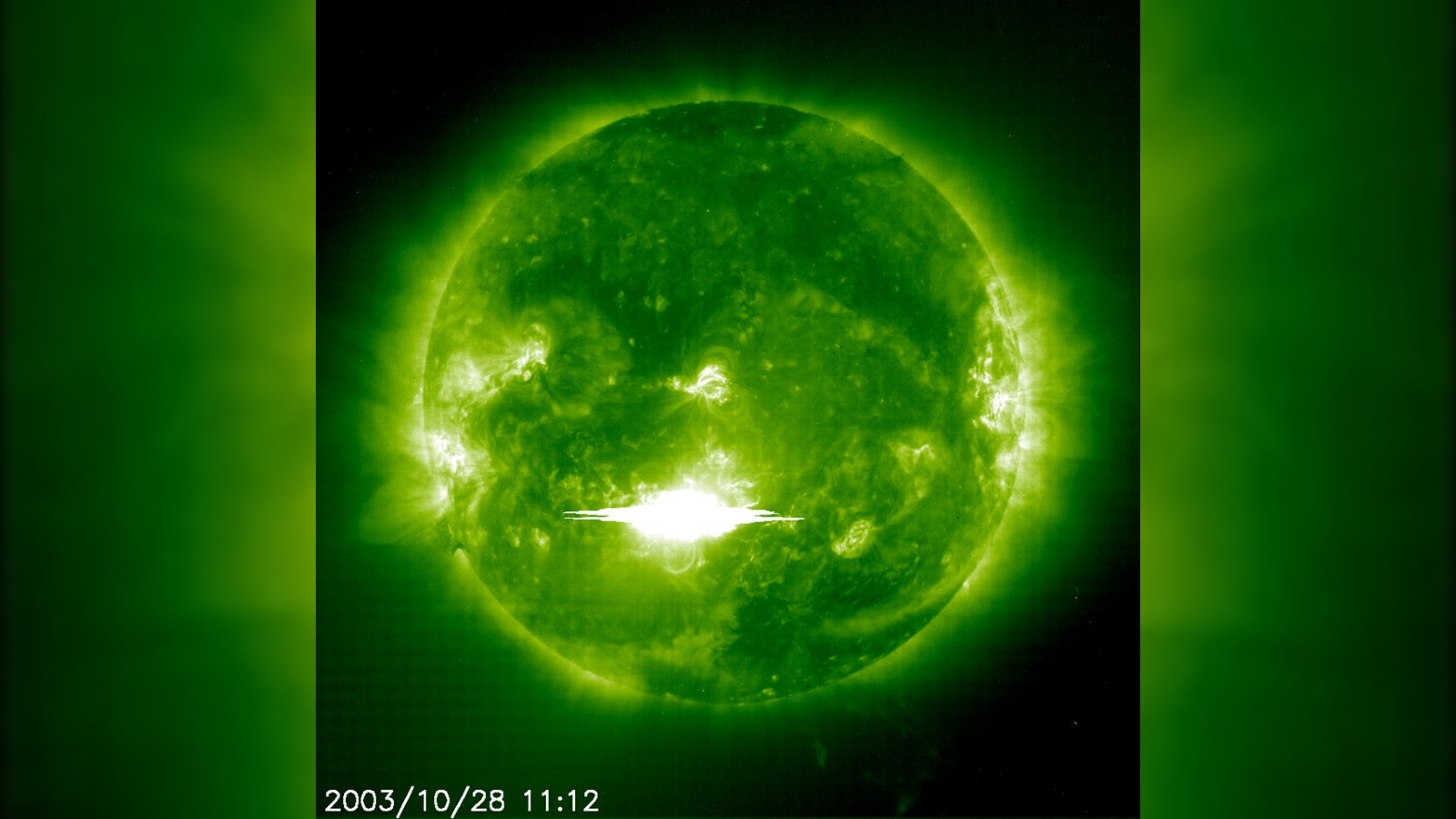Historic space photo: A monstrous 'Halloween storm' explodes from the sun
Around Halloween in 2003, a series of massive solar storms erupted from the sun, including an absolute monster coronal mass ejection (CME) that remains the most powerful solar outburst in modern records.

Get the world’s most fascinating discoveries delivered straight to your inbox.
You are now subscribed
Your newsletter sign-up was successful
Want to add more newsletters?

Delivered Daily
Daily Newsletter
Sign up for the latest discoveries, groundbreaking research and fascinating breakthroughs that impact you and the wider world direct to your inbox.

Once a week
Life's Little Mysteries
Feed your curiosity with an exclusive mystery every week, solved with science and delivered direct to your inbox before it's seen anywhere else.

Once a week
How It Works
Sign up to our free science & technology newsletter for your weekly fix of fascinating articles, quick quizzes, amazing images, and more

Delivered daily
Space.com Newsletter
Breaking space news, the latest updates on rocket launches, skywatching events and more!

Once a month
Watch This Space
Sign up to our monthly entertainment newsletter to keep up with all our coverage of the latest sci-fi and space movies, tv shows, games and books.

Once a week
Night Sky This Week
Discover this week's must-see night sky events, moon phases, and stunning astrophotos. Sign up for our skywatching newsletter and explore the universe with us!
Join the club
Get full access to premium articles, exclusive features and a growing list of member rewards.
What it is: A solar flare exploding on the sun's surface
When it was taken: Oct. 28, 2003
Where it is: The sun, around 93 million miles (150 million kilometers) from Earth
Why it's so special: During the spooky season of 2003, the sun spit out an unusually powerful series of solar flares, known as the "Halloween solar storms." The most powerful of these flares (pictured above) exploded from the sun's surface on Oct. 28 and launched a high-speed burst of electrically charged particles, called a coronal mass ejection (CME), that smashed into Earth the next day.
The monstrous eruption was an X-class flare — the most powerful class the sun is capable of producing — with an estimated magnitude of 45, which remains the most powerful in modern databases, according to NASA. (The flare was too powerful to be accurately detected by scientific equipment at the time, so its magnitude was calculated afterward.)
The plume of plasma erupted from a sunspot wider than 13 Earths, according to the National Oceanic and Atmospheric Administration (NOAA). The resulting CME temporarily knocked out half of the satellites orbiting Earth at the time and forced astronauts on the International Space Station to take cover from the radiation.
On Earth, the resulting geomagnetic storm raged for three days, creating temporary radio blackouts across large parts of the globe and even causing permanent damage to electrical infrastructure in some places. Auroras were also clearly visible as far south as California, Texas and Florida, according to NOAA.
Get the world’s most fascinating discoveries delivered straight to your inbox.
Experts say the superpowered storm could have been the largest since the Carrington Event in 1859, which, excluding inexplicably powerful ancient Miyake events, is the most powerful known solar storm in human history.
If a solar storm as large as the 2003 behemoth hit Earth today, the repercussions could be much more terrifying because there are thousands more satellites in orbit and we are much more reliant on them than we were back then.
All indications suggest that the sun's upcoming period of peak activity, the solar maximum, will be the strongest in decades.

Harry is a U.K.-based senior staff writer at Live Science. He studied marine biology at the University of Exeter before training to become a journalist. He covers a wide range of topics including space exploration, planetary science, space weather, climate change, animal behavior and paleontology. His recent work on the solar maximum won "best space submission" at the 2024 Aerospace Media Awards and was shortlisted in the "top scoop" category at the NCTJ Awards for Excellence in 2023. He also writes Live Science's weekly Earth from space series.
 Live Science Plus
Live Science Plus










